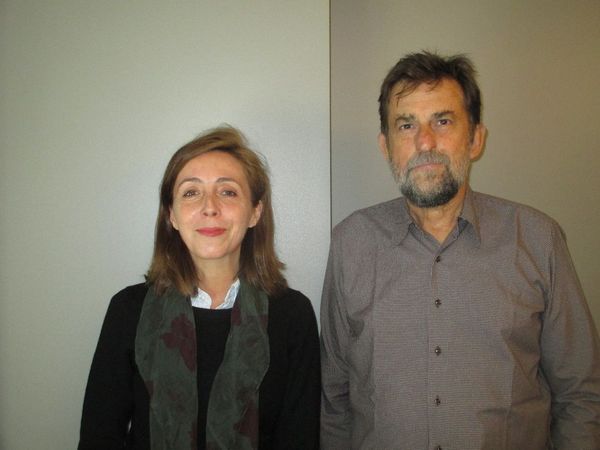 |
| Mia Madre director Nanni Moretti with Anne-Katrin Titze Photo: Lilia Blouin |
Margherita Buy, Giulia Lazzarini, John Turturro, Beatrice Mancini, Enrico Ianniello and Nanni Moretti star in Mia Madre (My Mother), Moretti's multi-layered, personal and universal exploration into private emotions and public movie work.
Meeting the director for a morning conversation at the Regency Hotel on Park Avenue, not far from Central Park, we discussed how Wim Wenders' angels from Wings Of Desire fit in with Mia Madre, grammar turning into grandma and the work of mourning.
 |
| Nanni Moretti as Giovanni: "There is reality, there is the film inside the film and then there's dreams, memories, fantasies." |
I had suggested screening We have A Pope (Habemus Papam), when Robert Zemeckis’s The Walk, the New York Film Festival's Opening Night Gala screening was moved a day due to the visit of Pope Francis and the Film Society of Lincoln Center was considering #Free Friday screenings for September 25.
Moretti's own mother was dying during the filming of Habemus Papam, which prompted his most recent film. Now, with the US premiere of Mia Madre in New York and Nanni spotting the Pope in person, he has come full circle.
"Work for all," the striking employees of a factory chant during the demonstration that starts the film. It turns out to be the film within the film, directed by Margherita (Buy) who at that point in time is worried about Ada (Lazzarini), her mother in the hospital. Things turn from complicated to ridiculous with the arrival of American actor Barry Huggins (John Turturro). Turturro epitomises the concept of the unbearable actor here.
The simplicity of what is being desired and the impossibility of getting there prove to be remarkably strong for everybody involved. "Can't you get real faces?" Margherita's longing manifests itself in the eyebrows or lips of her film's extras and in the way she deals with her ex-boyfriend, Vittorio (Enrico Ianniello).
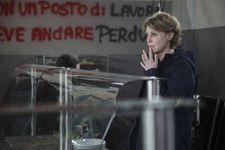 |
| Margherita Buy as Margherita: "And in terms of work, yes, Margherita does have a very strong relationship with her work." |
In perfect harmony, the dying mother, who used to be a teacher of Latin - beloved by her students, the bastion of logic and structure, holding the key to understanding language - combines the imaginary and the symbolic. Of course, this brings about an existential crisis and feels like the crashing of a car against the wall. Livia (Beatrice Mancini), Margherita's teenage daughter, though heartbroken herself about her beloved grandmother's impending death, is a pillar of strength.
Mia Madre coolheadedly spirals into and out of dream sequences and scenes from the movie being shot as Nanni Moretti boldly uses the unconscious to link meaning. Often we do not know right away what is what.
Anne-Katrin Titze: I haven't seen a depiction of how you dream when you worry in such a realistic way.
Nanni Moretti: Thank you. I actually wanted for these different layers to be intertwined constantly. There is reality, there is the film inside the film and then there's dreams, memories, fantasies. And I'm not unhappy if the viewer watches a scene and doesn't immediately understand what plane we're focusing on.
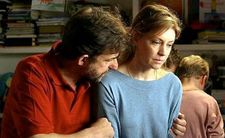 |
| Giovanni with his sister Margherita: "Sometimes we are so close to those we love, that we can't even see them in their entirety." |
AKT: Which is exactly how it feels when we worry. I remember waking up and not immediately knowing what is dream and what is waking state. That's what I meant by realistic.
NM: Yes, and all those levels, the dream, the memory, imagination, I didn't want to characterise them very strictly in terms of style. I wanted for them to ease into each other with unclearly cut borders.
AKT: Two things are clearly central to Mia Madre - work and grammar.
NM: The grandma is important actually because you don't want just the relationship between a mother and a daughter, you also have a relationship between a grandmother and a granddaughter. That kind of relationship is more direct, more straight forward without filters, immediate. And in terms of work, yes, Margherita does have a very strong relationship with her work. Whereas, for example, the brother even quits his job because he is too hit by the mother's disease. I have a hard time theorising about my movies, however, I do see a symmetry between Giovanni, the brother, voluntarily quitting his job and the workers in the factory who were being laid off.
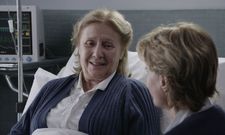 |
| Giulia Lazzarini as Ada with Margherita: "This intense relationship with her job, the difficulty in taking care of her own mother …" |
About this very close relationship that Margherita has with her work - I wanted to attribute to her, a female character, characteristics that are usually associated to male characters. This intense relationship with her job, the difficulty in taking care of her own mother and the very hard, detached way in which she treats her temporary boyfriend. When she tells him "Vittorio, come on! I'm shooting a movie here."
AKT: And his response is "I need to protect myself." It might be true, but it sounds really wimpy at that moment. But I need to clear something up. There was a very interesting Freudian misunderstanding we just had. I said grammar, not grandma. Grandma [Giulia Lazzarini] is a Latin teacher, Barry [John Turturro] speaks of himself in the third person, structuring, that's where I was going with my question. But I like the other answer too.
NM [laughing, then serious]: The film is also a film about what remains with us who are still alive when people we care about pass away. And this is the Latin that the grandmother teaches the granddaughter, those boxes full of books. And the stories that the former students relate to the family. About this there is one thing that I am embarrassed talking about because it's very personal and quite painful.
 |
| Giovanni with Margherita: "Sadly in my real life, I'm a lot more like Margherita. I am not like Giovanni." |
But after my own mother passed away - she was a Latin and Greek teacher - through the stories related to me by her former students who covered a wide range of age groups, some were in their 40s, some were even 70, I seemed to grasp in these stories that there was something substantial about my mother which I had not understood. Sometimes we are so close to those we love, that we can't even see them in their entirety.
AKT: I want to talk about the scene at the cinema. The poster looks like Wings Of Desire.
In Mia Madre, an enormous line in front of a cinema curls through the nightly streets of Rome.
NM: Yes, it is Wings Of Desire by Wim Wenders.
AKT: I talked with Wim a few weeks ago about that and he told me that you contacted him to ask permission. I thought it was such an interesting choice, because the character you play, Giovanni, seems almost too good to be true. Is he an angel?
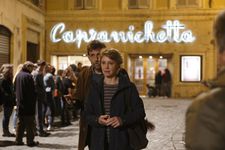 |
| Cinema with Wings Of Desire poster in Mia Madre: "You could say that he is a projection of Margherita." |
NM: Yes. He is what Margherita and to an extent myself in real life would aspire to be. I will exaggerate and elaborate on that with what in Italian we call "embroidery." You could say that he is a projection of Margherita.
AKT: And that might be one of the reasons why the boyfriend has such a hard time?
NM: Sadly in my real life, I'm a lot more like Margherita. I am not like Giovanni.
AKT: As an aside - because of the visit by Pope Francis, the Film Society of Lincoln Center postponed the Opening Night Gala of the festival and opted to have a day of free screenings that Friday. I suggested for them to show your film, Habemus Papam - We Have a Pope.
NM: Now that time has gone by, people are going to think that I did We Have A Pope after Ratzinger's resignation. But let's highlight that I did it two years before. The same people, Catholics, who when I did my movie said, it's so unlikely, it's impossible that a pope would be so cowardly. When he actually did do it, they said, "oh it's such a revolutionary choice." I was actually walking near Central Park the other day, and I was blocked at one point and I saw the Pope on a car with Cardinal Dolan.
_225.jpg) |
| Margherita with American actor Barry Huggins (John Turturro) |
AKT: Is that the first time you saw this Pope?
NM: Yes!
AKT: You had to come to New York to see the Pope to make it full circle.
NM: Yes!
Mia Madre is a film about work. Work when it becomes achingly hollow because a loved one is dying and work when it gives structure and meaning to life. The mourners act toward tomorrow, the only way possible - by facing today. Sometimes that means leading two lives, one about what is really on your mind, the other keeping up the appearance of what you are doing. In the case of Moretti's Giovanni, it means the end of one to be able to do the other.
Mia Madre opens in the US January 2016 and is currently in cinemas in the UK as My Mother.





















